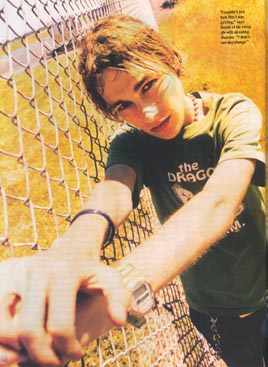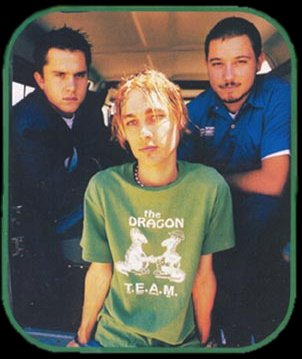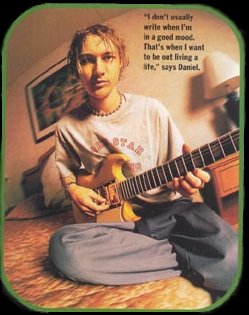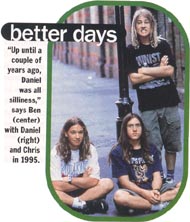Silverchair
Frontman Daniel Johns Talks Openly about his Painful Battle
with Depression, Anxiety and a Life-Threatening Eating Disorder
Teen People
By Daniel Johns as told to Michele Promaulayko
Photos by John Acurso
 In
1995, an Australian trio called silverchair emerged on the
American music scene with Frogstomp, a grunge-rock
album whose sophistication belied the musicians’ tender ages.
At the time, lead singer and guitarist Daniel Johns was only
15 years old; drummer Ben Gillies and bassist Chris Joannou
were both 14. Amazingly, the album went double platinum. Two
years later, the boys released Freak Show, which
despite decent sales abroad never came close to the success
of Frogstomp in the U.S. Now the pendulum has swung
again, with Ana's Song (Open Fire), a hit single
off their latest album, Neon Ballroom, that became
a staple on MTVs Total Request Live. But the strain of this
roller-coaster ride has taken its toll, particularly on Daniel,
the group's frontman and primary songwriter. His decline began
in early 1998, when he sequestered himself for six months
in a rented beach house in the band's hometown of Newcastle.
Although notoriously private, Daniel, now 20, opens up about
that experience. "The trappings of fame."
In
1995, an Australian trio called silverchair emerged on the
American music scene with Frogstomp, a grunge-rock
album whose sophistication belied the musicians’ tender ages.
At the time, lead singer and guitarist Daniel Johns was only
15 years old; drummer Ben Gillies and bassist Chris Joannou
were both 14. Amazingly, the album went double platinum. Two
years later, the boys released Freak Show, which
despite decent sales abroad never came close to the success
of Frogstomp in the U.S. Now the pendulum has swung
again, with Ana's Song (Open Fire), a hit single
off their latest album, Neon Ballroom, that became
a staple on MTVs Total Request Live. But the strain of this
roller-coaster ride has taken its toll, particularly on Daniel,
the group's frontman and primary songwriter. His decline began
in early 1998, when he sequestered himself for six months
in a rented beach house in the band's hometown of Newcastle.
Although notoriously private, Daniel, now 20, opens up about
that experience. "The trappings of fame."
Believe it or not, I never had any desire to be famous -- I just wanted to
play music. And at 14, I thought it was the coolest thing
in the world to get a record deal with Epic so we could make
a CD and call ourselves a real band. But because we were discovered
so early, I don't think I had any concept of what fame would
be like, which is probably why it was so confusing. I quickly
discovered that fame is like anything else -- get too much
of it and it can have a negative effect. By the time our debut
album, Frogstomp, went double platinum in 1995, the
amount of time we had to ourselves was virtually zero. It
was just too much all at once, especially for me. Ben and
Chris could go out and be relatively inconspicuous, but even
if I was wearing a disguise, it would only take one person
to recognize me and my cover would be blown.
 "As
our popularity grew, so did people's expectations. When you're
a guy in a band, everyone thinks you should be happily swimming
in girls. But it's just not that way unless you're a really
confident person to start with. Or if you can take advantage
of people, which is not what I want to do. So every time the
crowd got bigger, I felt more empty when I walked offstage.
Alone in the crowd Toward the end of 1997, while we were on
the road touring for our second album, Freak Show,
I gradually began to feel more and more alienated from people.
By the start of 1998, it got really extreme-to the point where
I really didn't want to see anyone. Thankfully, the tour was
about to end. As soon as we got home to Newcastle, I took
my three-and-a-half-year-old dog, Sweep, moved out of my parents'
place and rented a two-bedroom house near the beach. It was
the middle of winter in Australia, and the house wasn't heated,
so it was really cold and uncomfortable. And empty. There
was a couch, a television, a bed and a stereo -- that's it.
After about a week, I bought a foot heater and just sat, despondent,
in front of it all day. Then things took a turn for the worse.
The psychological problems that surfaced on tour intensified,
and my view of reality became really distorted. It started
as depression and branched out from there. I began to feel
really anxious and paranoid. I couldn't leave my house without
thinking that something terrible was going to happen, whether
it was getting beaten up or being hounded by photographers.
The minute I'd step out my door, I'd start shaking and sweating,
and I could feel my heart pumping like crazy. I know it sounds
strange, but I was also really freaked out by phones. When
mine rang, I'd have to leave the room to get away from it.
I began limiting my food intake as a way to control the chaos
I was feeling inside. Each day, I would test myself to see
how much I could endure. If I hadn't eaten anything, it was
an accomplishment; I would go to bed content. The only way
I can describe it is to say that it felt comforting to be
in control of something, like I hadn't totally lost it.
"As
our popularity grew, so did people's expectations. When you're
a guy in a band, everyone thinks you should be happily swimming
in girls. But it's just not that way unless you're a really
confident person to start with. Or if you can take advantage
of people, which is not what I want to do. So every time the
crowd got bigger, I felt more empty when I walked offstage.
Alone in the crowd Toward the end of 1997, while we were on
the road touring for our second album, Freak Show,
I gradually began to feel more and more alienated from people.
By the start of 1998, it got really extreme-to the point where
I really didn't want to see anyone. Thankfully, the tour was
about to end. As soon as we got home to Newcastle, I took
my three-and-a-half-year-old dog, Sweep, moved out of my parents'
place and rented a two-bedroom house near the beach. It was
the middle of winter in Australia, and the house wasn't heated,
so it was really cold and uncomfortable. And empty. There
was a couch, a television, a bed and a stereo -- that's it.
After about a week, I bought a foot heater and just sat, despondent,
in front of it all day. Then things took a turn for the worse.
The psychological problems that surfaced on tour intensified,
and my view of reality became really distorted. It started
as depression and branched out from there. I began to feel
really anxious and paranoid. I couldn't leave my house without
thinking that something terrible was going to happen, whether
it was getting beaten up or being hounded by photographers.
The minute I'd step out my door, I'd start shaking and sweating,
and I could feel my heart pumping like crazy. I know it sounds
strange, but I was also really freaked out by phones. When
mine rang, I'd have to leave the room to get away from it.
I began limiting my food intake as a way to control the chaos
I was feeling inside. Each day, I would test myself to see
how much I could endure. If I hadn't eaten anything, it was
an accomplishment; I would go to bed content. The only way
I can describe it is to say that it felt comforting to be
in control of something, like I hadn't totally lost it.
Within a few months, it got to the point where I was eating just so I wouldn't
collapse. If I felt like I was going to black out, I'd eat
a piece of fruit or a cup of soup. What little food I did
eat, my family brought over. At that time, my parents and
my younger brother and sister were the only people I trusted
and could see without feeling anxious. Of course they were
all worried sick about me, but I couldn't really see how bad
it was. When I went out, usually it was to drive my Jeep to
the video store down the street. In the course of six months,
I racked up a $1,600 bill. At first, I only rented really
dark films, like Leaving Las Vegas, because that's the frame
of mind I was in. But eventually, I'd watch just about anything
to pass the time and help me get through another day. Emotional
rescue Some weeks were better than others. When I could, I'd
make an appointment with the therapist my parents convinced
me to see before I moved out of their house. But I found it
too exposing to talk about my problems. I was always holding
back. I'd much rather express myself through music and lyrics
than in conversation. It's more therapeutic for me.
 It
was during this period that I began writing the poetry that
would become the lyrics for most of Neon Ballroom.
There is a lot of symbolism in those songs. For example, Paint
Pastel Princess is a metaphor for Aropax, an antidepressant
that my doctor prescribed for me. The song's about how taking
that type of medication prevents you from feeling highs or
lows -- everyday is the same. Still, the pills improved my
state of mind. I don't intend to be on them forever, but for
now they're helping me cope.
It
was during this period that I began writing the poetry that
would become the lyrics for most of Neon Ballroom.
There is a lot of symbolism in those songs. For example, Paint
Pastel Princess is a metaphor for Aropax, an antidepressant
that my doctor prescribed for me. The song's about how taking
that type of medication prevents you from feeling highs or
lows -- everyday is the same. Still, the pills improved my
state of mind. I don't intend to be on them forever, but for
now they're helping me cope.
Ana's Song, the second single, is a metaphor for
anorexia. It was the last song recorded for the album, and
it was the first time I exposed my eating disorder to anyone.
Everyone already knew, I guess, but I had never spoken about
it, except with my family doctor. He was actually the one
who helped me realize how bad things had gotten. I went to
him because I had a bad cold that I just couldn't shake. (I
found out later that malnutrition wrecks your immune system.)
He's been my doctor since I was a baby, so as soon as he saw
me, he just started shaking his head. He sat me down and told
me the facts: If I didn't do something, I was going to die.
He explained that signs that generally occur well into an
eating disorder were already happening with me. Things like
exposed gums and teeth,protruding bones everywhere, sunken
cheeks. That was a turning point. I don't know exactly how
much weight I lost, but the lightest I ever got was 110 pounds.
It was never really my intent to harm myself, though I knew
what I was doing wasn't good for me. The lyrics of Ana's
Song, particularly "In my head, the flesh seems thicker"
are about my desire to see how far I could take it. The problem
is, you think you're gaining control over something, but in
reality, you're losing control over the functioning of your
body. A lot of people don't understand the real causes of
an eating disorder, which is why it's hard to fathom how a
guy can have one. But it isn't about vanity or beauty. When
you see anorexic people, they don't look attractive. I'm sure
the reason some people get eating disorders has to do with
a distorted body image, but often it has nothing to do with
looking a certain way. It's about gaining control over a part
of your life. Making sense of it all I've always had a fascination
with the darker side of life. I'm a bit fixated on it. The
reason, I think, has to do with the fact that I had a hard
time in high school.
 Back then, it wasn't as acceptable to be in a young band.
Nowadays, they're everywhere. When we started playing at 13,
I was called a fag and beaten up. Even though Ben and Chris
were in the band with me, for some reason they weren't subject
to the same ridicule. Probably because I was the singer and
they played relatively masculine instruments. They look more
masculine than I do. Plus, their bodies are more built up
and they were into sports. I've got nothing against jocks.
I don't care what people do as long as they're good people.
But I think that a lot of jocks have the opposite mentality
-- unless you're one of them, they're a little afraid of you.
As a result, I tend to close myself off to people. My way
of dealing with things has always been through art, whether
it's painting, drawing or writing music or poetry. All of
the songs on this album are intensely personal, and I feel
emotionally drained after performing them. No matter how many
times I sing them, certain lines remind me of how badly I
felt when I wrote them. But I'm glad I wrote them. People
have sent letters to our fan club saying that the album has
helped them admit to anxiety attacks, depression and eating
disorders. Some have said that it's made them cry, but I don't
necessarily think that's a bad thing. I'm just glad they've
gotten something good out of a negative experience I had.
I'm not fully recovered, but I think I've hit my lowest point
and I'm on my way up. I still don't know exactly what went
wrong. People have theorized that I had a nervous breakdown,
but it doesn't matter what anyone else says. I have to figure
it out for myself.
Back then, it wasn't as acceptable to be in a young band.
Nowadays, they're everywhere. When we started playing at 13,
I was called a fag and beaten up. Even though Ben and Chris
were in the band with me, for some reason they weren't subject
to the same ridicule. Probably because I was the singer and
they played relatively masculine instruments. They look more
masculine than I do. Plus, their bodies are more built up
and they were into sports. I've got nothing against jocks.
I don't care what people do as long as they're good people.
But I think that a lot of jocks have the opposite mentality
-- unless you're one of them, they're a little afraid of you.
As a result, I tend to close myself off to people. My way
of dealing with things has always been through art, whether
it's painting, drawing or writing music or poetry. All of
the songs on this album are intensely personal, and I feel
emotionally drained after performing them. No matter how many
times I sing them, certain lines remind me of how badly I
felt when I wrote them. But I'm glad I wrote them. People
have sent letters to our fan club saying that the album has
helped them admit to anxiety attacks, depression and eating
disorders. Some have said that it's made them cry, but I don't
necessarily think that's a bad thing. I'm just glad they've
gotten something good out of a negative experience I had.
I'm not fully recovered, but I think I've hit my lowest point
and I'm on my way up. I still don't know exactly what went
wrong. People have theorized that I had a nervous breakdown,
but it doesn't matter what anyone else says. I have to figure
it out for myself.
These days, it helps to focus on the things I want to do
when we're finished with this tour [in November]: Things like
seeing friends and not being tied to a schedule. Just stuff
that doesn't involve promoting the band or being "Mr. silverchair."
I'm not sure what the future holds. Unlike a lot of other
bands, our lives don't revolve around being stars. I'm just
looking forward to being happy. Whether it's producing music
for silverchair or being a bum on the beach.
[Thanks to Jacqueline for the transcript.]